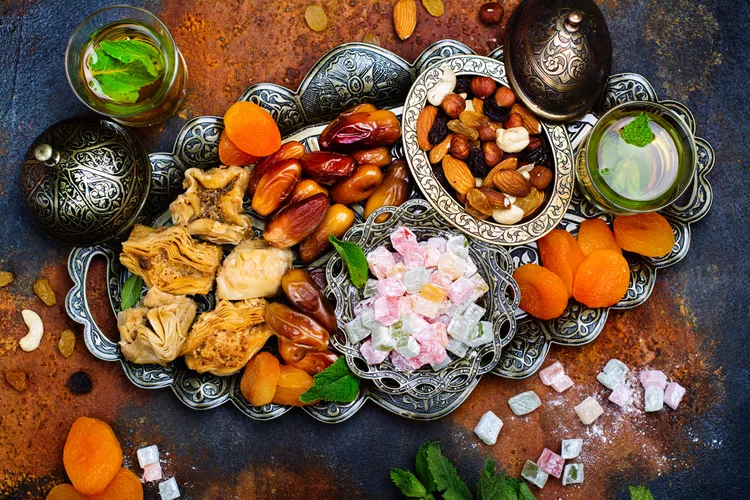Traditional foods of Iftaar come from the Middle East and South Asia. Photo courtesy of happy_lark.
ALEX MCCARTY | STAFF REPORTER | armccarty@butler.edu
On March 28, the Muslim Student Association (MSA) is hosting its annual Iftaar event in the Reilly Room at 7:15 p.m.. It will be open to all Butler students, faculty and staff, including non-Muslims and people who are not currently engaging in Ramadan. The event will feature a presentation on what Ramadan is and why so many people celebrate it, along with a prayer and dinner featuring traditional and cultural foods from the Middle East and South Asia.
The ninth month of the Islamic calendar began on March 10, and with it comes the celebration of Ramadan. This sacred month is a time for fasting, charity and celebration for the estimated 1.8 billion Muslims worldwide. They believe that the month of Ramadan was when God exposed the Quran to the prophet Muhammad.
For a period of 30 days, Muslims give up eating and drinking between sunrise and sundown. While the act of fasting every day for a month may seem challenging to some, there is more meaning to it than one might assume.
First-year health sciences major Zarrar Khan highlighted the important values behind fasting during Ramadan.
“The reason we fast is to help us grow closer to God and our faith,” Khan said. “It’s also to get the perspective of the not-so-fortunate.”
At sunset, the day is concluded with a breaking of the fast known as Iftaar. The customary way to break the fast is by eating a date with water, which leads into the meal and one of the five prayers performed throughout the day. This event is very community-driven and often brings the people celebrating Ramadan together.
Zayd Almaya, a junior biology major and MSA president, delved into the positive aspects of Iftaar and Ramadan as a whole.
“It’s more than just about restraining from eating,” Almaya said. “It’s also a spiritual month in which you work on yourself and have spiritual growth. It’s a month full of community as well. You get a lot closer to your family and neighbors. It’s a month that everyone looks forward to.”
While it is not required, non-Muslims are encouraged to practice fasting the day of the event to get the full experience. For those who do participate, there is a reflection at the end of the event where newcomers to fasting share their experiences with the practice.
Sumaiyah Ryan, a sophomore public health and sociology double major and MSA executive board member, offered some advice for anyone intimidated by fasting or the other customs of Ramadan.
“When people focus a lot on the food aspect, then it gets intimidating, but that’s not the point of Ramadan,” Ryan said. “During the day, it really makes you think a lot about your experiences, your privileges and what you can do to be a better person. Focusing on the values of Ramadan more so than not eating or drinking will help the intimidation a bit.”
For anyone interested in attending Iftaar, MSA sent out an RSVP form. Information can also be found through the MSA Instagram page @msabutler. Ramadan Mubarak — have a blessed Ramadan.



